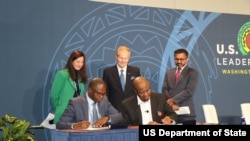The United States and a growing number of African nations are expanding their cooperation in outer space. “As we enter this new era in space development, it’s important to remember the tangible benefits that space partnership can deliver for our citizens,” said Assistant Secretary for Oceans and International Environmental and Scientific Affairs Monica Medina.
Assistant Secretary Medina welcomed Nigeria and Rwanda as the first two African nations to sign the Artemis Accords.
“The 23 Artemis Accords signatories represent a diverse set of nations with a wide range of space capabilities and interests,” she explained. “The Accords support our activities in NASA’s Artemis program, which aims to land the first woman and first person of color on the Moon, among other objectives. Through the Artemis program, the United States is building the broadest and most diverse international human space effort in human history.”
Space-based Earth observation satellites can provide tangible benefits to those living on Earth, noted Assistant Secretary Medina:
“For example, in the U.S. we use this to help us understand our fire-prone regions and how to contain damage, and save lives and minimize economic losses. Just last month, Uganda and Zimbabwe launched their first Earth observation satellites, which will perform analyses of water quality, land use cover, and soil fertility. . . .We look forward to partnering with African nations on future applications for space-based Earth-observation.”
At their core, said Assistant Secretary Medina, “our efforts in outer space serve to improve the lives of people in the United States, on the African continent, and indeed throughout the world.”
The United States also welcomed support from members of the African Group on a UN resolution calling on all States to commit not to conduct destructive direct ascent, anti-satellite missile tests:
“These tests jeopardize the long-term sustainability of outer space by damaging the space environment, and they endanger the use of space by all nations. We very much appreciate the strong support of the Africa Group at the nations in the UN General Assembly when we, the U.S., sponsored a resolution, which underscores this peaceful commitment to not using these types of satellite missile tests that would be so destructive. When we commit to safe, peaceful, and sustainable exploration and use of space, we can unlock its limitless potential.”






